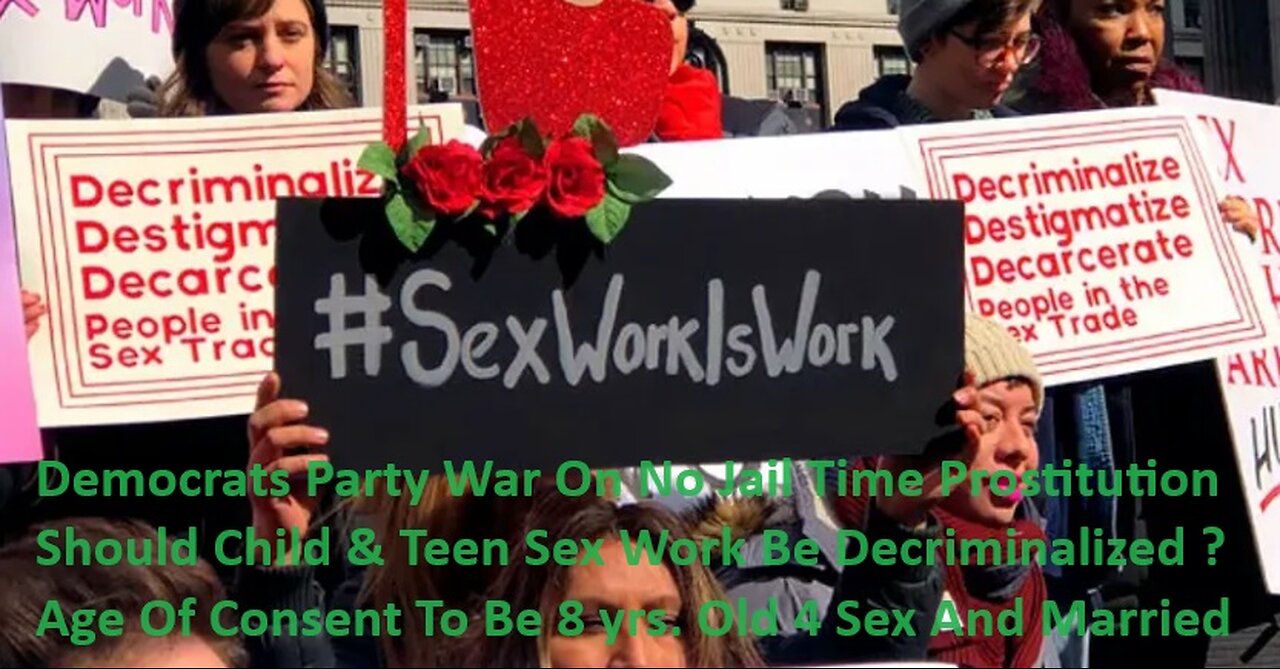Premium Only Content

Democrats Party War On No Jail Time Prostitution Should Sex Work Be Decriminalized
The Democrats Party War On No Jail Time For Prostitution And Should Child & Teen Sex Workers Be Decriminalized Along With Anyone Over 18 Years Old ? Age Of Consent To Be 8 yrs. Old 4 Sex And Getting Married ? Democrats Party has undergone a significant shift in its stance on sex work, with a growing number of members and leaders advocating for its decriminalization. This shift is evident in recent statements and actions from prominent Democrats.
While the Democrats’ worship of pre-born death may be the most literal example of their depravity, it is far from an outlier. The left is actively working to sexualize our children through the disgustingly inappropriate ‘Comprehensive Sexuality Education’ (CSE). The CSE program and its nationwide network of advocates are calling for sexuality education to be mandated for children as young as Kindergarten with sexually explicit images, and classroom discussion beginning at age eight or nine... as set for the new age of consent is to be lowered to 8 years. old for sex and getting married is o.k. after young girl get 3 regular period in a row 1 month apart by laws.
In fact, in one of the classroom discussion lesson called ‘Making A Difference’ the teacher is instructed to ask the question, “what is abstinence?” The teacher is then instructed to elicit specific responses from the children such as “mutual masturbation in class, holding hands, and yes performing oral sex on classmates, kissing, anal sex” boy on boy and girl on girl and the list goes on on on as the new age of consent is to be lowered to 8 yrs. old for sex and getting married is o.k. after young girl get 3 regular period in a row 1 month apart by laws.
Mainstreaming Decriminalization
In 2023, Maine’s Democratic Governor Janet Mills decriminalized prostitution, marking a historic first. Similarly, Manhattan District Attorney Alvin Bragg has promised not to prosecute sex workers. In April, numerous House Democrats partnered with a left-wing advocacy group focused on decriminalizing prostitution.
Radical Left Influence
The “Squad” members, known for their progressive views, have long been vocal about decriminalizing sex work. Representative Ayanna Pressley believes sex work is about equity, and Representative Alexandria Ocasio-Cortez has described it as a legitimate career path for women.
Mainstream Support
However, decriminalization is no longer limited to the radical left. Democratic governors have signed legislation blocking law enforcement from cracking down on prostitution, and some Democrats claim that sex work is a legitimate career choice for women.
Contrasting Views
Not all Democrats support decriminalization. In 2019, Representative Seth Moulton stated that while sex work should be decriminalized, those soliciting prostitution should face stiff criminal penalties.
Public Opinion
A recent poll found that a majority of the country, including 2/3 of Democrats and voters under 45, support decriminalizing sex work.
Community Perspectives
Victoria Walker, a community member, shared her personal experience of being coerced into sex work by police in Connecticut. She emphasized the importance of decriminalization, citing the need to prioritize the safety and well-being of sex workers and their families.
Conclusion
The Democratic Party’s stance on sex work has evolved, with a growing number of leaders and members advocating for its decriminalization. While there are still differing opinions within the party, the trend suggests a shift towards recognizing sex work as a legitimate issue of equity and safety, rather than solely a matter of criminal justice.
Democrats Party War On Our Children 2024 Pedophile Kamala D. Harris Comprehensive "Sexuality Education Agenda Approve By Democrats Party UN 2030" Unpacking Sex Worker Kamala Devi Harris A American Politician! A Notable Quotes From “I Don’t Know What The Term ‘Teenage Prostitute’ Means. I Have Never Met A ‘Real Teenage Prostitute.’ I Have Met 100s Exploited Kids.” - Kamala D. Harris - A Former Sex Worker Herself !
Joe Biden And Kamala Harris’ stance on prostitution emphasizes the need to protect victims of exploitation and abuse, rather than criminalizing sex workers. Her support for decriminalization aims to address the root causes of prostitution and ensure the safety and well-being of those involved.
Secret Pedophile Kamala Devi Harris's New World Order And The Next President Of The U.S.A.. So Yes That All America People's Must Understand Children Age Of Consent Is "9 Years Old" Wife Aisha Per Old Sharia Laws. She Supports Prostitute Decriminalizing ALL Sex Work, With A focus On Protecting The Rights And Safety Of Children Sex Workers. These topics are essential components of comprehensive sexuality education, as recommended by the United Nations and various organizations, such as UNESCO, UNFPA, UNICEF, UN Women, UNAIDS, and WHO.
In advocating for policies on, and investments in, comprehensive sexuality education, in and out of schools, UNFPA and partners recognized that traditional sexuality education does not meet the needs of all young people, such as populations outside of school.
Comprehensive sexuality education curriculum variations in sexual expression: including discussions of vaginal intercourse, oral sex, anal sex, mutual masturbation, and virtual sex.
The following aspects are essential components of a comprehensive sexuality education curriculum, covering variations in sexual expression:
Vaginal Intercourse: Teach accurate information about the physical and emotional aspects of vaginal intercourse, including the risks of unintended pregnancy and sexually transmitted infections (STIs).
Oral Sex: Discuss the mechanics and risks associated with oral sex, including the transmission of STIs and the importance of consent and communication.
Anal Sex: Include information on the physical and emotional aspects of anal sex, highlighting the increased risk of STI transmission and the importance of safe and consensual practices.
Mutual Masturbation: Emphasize the importance of mutual consent and communication in sexual activities, including mutual masturbation, and discuss the benefits of exploring sexual pleasure in a safe and respectful manner.
Virtual Sex: Address the growing importance of online sexual expression and the potential risks associated with virtual sex, such as cyberbullying, online harassment, and the dissemination of misinformation.
War On Our Children Kamala D. Harris Comprehensive Sexuality Education Agenda - https://rumble.com/v58qxol-war-on-our-children-kamala-d.-harris-comprehensive-sexuality-education-agen.html
Democrats Party War On Our Children 2024 Pedophile Kamala D. Harris Comprehensive "Sexuality Education Agenda Approve By Democrats Party UN 2030" Unpacking Sex Worker Kamala Devi Harris A American Politician! A Notable Quotes From “I Don’t Know What The Term ‘Teenage Prostitute’ Means. I Have Never Met A ‘Real Teenage Prostitute.’ I Have Met 100s Exploited Kids.” - Kamala D. Harris - A Former Sex Worker Herself !
chrome-extension://efaidnbmnnnibpcajpcglclefindmkaj/https://www.unfpa.org/sites/default/files/pub-pdf/ITGSE.pdf
chrome-extension://efaidnbmnnnibpcajpcglclefindmkaj/https://sexedu.org.tw/guideline.pdf
What Americans Think About Prostitution Laws. Support for sex worker rights crosses all sorts of demographic lines, according to a new poll from the group Data for Progress. The group found that 52 percent of American adults support decriminalizing prostitution, with replies equally split between "strongly support" and "somewhat support." Just 35 percent were opposed, with 13 percent unsure.
For the survey, conducted last November and released last week, pollsters asked people if they would support or oppose "decriminalizing sex work as New Zealand did in 2003." They explained that "this would remove criminal penalties for adults to sell and pay for consensual sex while also maintaining laws that criminalize violence."
Among younger voters, enthusiasm for decriminalization was even stronger than in the general population. Sixty-five percent of 18- to 29-year-olds were in favor, with just 26 percent opposed. And 66 percent of 30- to 44-year-olds were in favor, with just 23 percent opposed.
Support among older groups alone was still substantial: 45 percent of 45- to 54-year-old respondents favored decriminalization, as did 43 percent of 55- to 64-year-olds and 42 percent of the 65-and-older crowd. The oldest cohort was the only one to feature stronger opposition to decriminalization than support, with 51 percent either somewhat or strongly opposed to the idea.
Support for decriminalization crossed not just age cohorts but also party lines. Support was highest among Democrats, with 64 percent in favor. But 55 percent of independents were also on board, along with 37 percent of Republicans.
A mere 22 percent of Democratic respondents were against decriminalization, as were 25 percent of independents and 54 percent of Republicans.
Support for decriminalization also crossed the urban/suburban/rural divide:
62 percent of urban Democrats, 66 percent of suburban Democrats, and 60 percent of rural Democrats said they support decriminalization.
49 percent of urban independents, 66 percent of suburban independents, and 49 percent of rural independents were supportive.
46 percent of urban Republicans, 35 percent of suburban Republicans, and 35 percent of rural Republicans agreed.
Suburban Democrats were the most likely of all demographic groups to express strong support, while suburban Republicans were the most likely to strongly oppose the idea. Urban independents and suburban Democrats were the least likely to express strong opposition.
A later question on the Data for Progress poll dealt specifically with policing prostitution. "Vice policing units often enforce laws against consensual sex work," the pollster would tell respondents. "One strategy they use is undercover stings and raids, in which plainclothes officers pose as potential customers, solicit sex workers and then arrest them." Respondents were then asked if they were for or against "defunding vice policing dedicated to criminalizing sex work."
"Overall, support for this policy was statistically the same as support for decriminalization," notes the Data for Progress report. "About 49 percent of voters support ending vice policing of sex work, compared to 35 percent who oppose it."
Again, support was highest among Democrats—59 percent were either somewhat or strongly supportive—but still substantial among other political groups. Forty percent of Republicans and 38 percent of independents wanted to stop vice cops from doing sex stings. And with decent numbers of all groups undecided, only 24 percent of Democrats, 46 percent of Republicans, and 39 percent of independents were outright opposed.
Suburban Democrats were the most likely to say yes to defunding sex cops (66 percent were in favor), but majorities of urban and rural Democrats agreed. And support was also relatively high among suburban independents (49 percent), urban Republicans (45 percent), and rural Republicans (42 percent).
Only three cohorts saw less than 40 percent of respondents opposed to vice stings, with support lowest among urban independents. Urban independents were also the most unwilling to stop the stings, at 53 percent.
Broken down by age, older millennials and younger Gen Xers were again the most supportive of sex worker rights on this question. A full 59 percent of 30- to 44-year-old respondents supported ending stings on sex workers. The youngest cohort trailed just behind, at 56 percent.
The 65-and-older cohort was also into the idea, with almost a majority—49 percent—saying they would end vice policing of consensual sex.
While the Democrats’ worship of pre-born death may be the most literal example of their depravity, it is far from an outlier. The left is actively working to sexualize our children through the disgustingly inappropriate ‘Comprehensive Sexuality Education’ (CSE). The CSE program and its nationwide network of advocates are calling for sexuality education to be mandated for children as young as Kindergarten with sexually explicit images, and classroom discussion beginning at age eight or nine... as set for the new age of consent is to be lowered to 8 years. old for sex and getting married is o.k. after young girl get 3 regular period in a row 1 month apart by laws.
In fact, in one of the classroom discussion lesson called ‘Making A Difference’ the teacher is instructed to ask the question, “what is abstinence?” The teacher is then instructed to elicit specific responses from the children such as “mutual masturbation in class, holding hands, and yes performing oral sex on classmates, kissing, anal sex” boy on boy and girl on girl and the list goes on on on as the new age of consent is to be lowered to 8 yrs. old for sex and getting married is o.k. after young girl get 3 regular period in a row 1 month apart by laws. The above CSE classroom discussion is directed to be had with children in FOURTH GRADE and has received federal funding from the Teen Pregnancy Prevention Program within the Department of Health and Human Services. There is no other way to describe this than the utter death and destruction of our children’s innocence and raped at our school bathroom etc.
Only Tulsi Gabbard Wants to Decriminalize Sex Work, but Other Dems Show Signs of Progress on the Issue. "If a consenting adult wants to engage in sex work, that is their right," Gabbard says.
A majority of Americans now favor "removing criminal penalties for adults to sell and pay for consensual sex," with support particularly high among Democrats and younger voters but also crossing party and age lines. Yet most of the Democrats running for president prefer to keep quiet about sex work issues, and only one remaining candidate—Rep. Tulsi Gabbard (D–Hawaii)—has publicly expressed support for decriminalizing prostitution.
"If a consenting adult wants to engage in sex work, that is their right, and it should not be a crime," Gabbard said in a statement this weekend to Reason. "All people should have autonomy over their bodies and their labor."
Gabbard is the only one to get a good grade on a recent report card put out by the group Decriminalize Sex Work (DSW). "Gabbard supports the full decriminalization of sex work, which removes criminal and civil penalties from adults engaged in consensual acts of prostitution," the group reports.
DSW gave Gabbard an A-. She didn't get a perfect score because she voted for FOSTA, which made hosting content that facilitates prostitution a federal crime. FOSTA and the federal war on websites like Backpage have made sex work more dangerous and made it harder for police to find people who do need help, according to preliminary evidence. All of the Democratic presidential candidates in Congress voted for FOSTA, with Minnesota Sen. Amy Klobuchar signing on a co-sponsor of the Senate companion bill (SESTA), as did former presidential candidates Kamala Harris, Cory Booker, and Kirsten Gillibrand.
Recently, though, Rep. Ro Khanna (D–Calif.) introduced legislation that he sees as a potential first step to FOSTA's repeal—and the bill's Senate companion was introduced by Sen. Elizabeth Warren (D–Mass.) with Sen. Bernie Sanders (I–Vt.) as a co-sponsor. (Ron Wyden of Oregon, the only Democrat in the Senate to vote against FOSTA in the first place, is also a co-sponsor.)
"As lawmakers, we are responsible for examining unintended consequences of all legislation, and that includes any impact SESTA-FOSTA may have had on the ability of sex workers to protect themselves from physical or financial abuse," said Warren in December, when the SAFE SEX Workers Study Act was introduced.
Warren tweeted last July that she's "open to decriminalization" of prostitution. But she's also fond of financial regulations that make it harder for people in sex workers (even in legal industries) to get bank accounts or use online payment processors.
DSW gave Warren a C+ and Sanders a C, the same grade given to Pete Buttigieg.
The former South Bend, Indiana, mayor has made few statements about the issue. (His campaign did not respond to Reason's request for comment.) He told Out magazine in May 2019 that he was "not ready to make policy news on this yet." But he also sounded at least amendable to changing in a sex-worker-rights-friendly direction some day.
"We now understand that [FOSTA] harmed vulnerable people," Buttigieg told Out last year. "This needs to be part of a larger conversation about how we treat sex workers and all of the reasons why this society hesitates to embrace the idea of sex work. I don't think all of those ideas are wrong."
That candidates are routinely being asked about sex work this election is itself noteworthy. "In the last campaign cycle, there were not candidates talking about sex work," says Melissa Sontag Broudo, general counsel for Decriminaize Sex Work and co-founder of the Sharmus Outlaw Advocacy and Rights Institute.
"Just to see this conversation happening on this level is, I think, huge," she adds.
"It's the first time sex work has become an issue in a presidential election—that's historic," says Bella Robinson, who has been doing sex work for more than three decades and leads the Rhode Island chapter of Call Off Your Old Tired Ethics. After FOSTA passed, Robinson's group worked with the Sex Workers Outreach Project to study the effect on sex workers. (See highlights from their research here.)
Robinson is wary of proposals like the Warren and Sanders-sponsored sex work study bill and accuses the candidates of merely paying "lip service" to sex worker rights. "I agree we could use more research," she says. "But why would we trust the government?"
Robinson's group has tried to reach out to the Warren and Sanders campaigns, with little luck, she tells me.
Broudo and others at Decriminalize Sex Work attempted to talk with someone on the campaign of all of the remaining Democratic candidates, though some were more receptive than others. "Repeated attempts to contact [Andrew] Yang's campaign went unanswered," according to Kaytlin Bailey, communications director for Decriminalize Sex Work. The same went for Joe Biden's campaign. (Yang's team responded to me promptly, but only to say he has no comment.)
One campaign that did respond to the group was Klobuchar's, and the representative was polite and seemed open to hearing them out, according to Broudo. She says she considers even open-mindedness from candidates like Klobuchar something of a success, and "a pretty big signal" that the conversation around sex work is shifting.
Klobuchar has a history of spouting crazy sex-trafficking myths and backing the bad policies that stem from them. She now "appears to support the Suppression Model," says the Decriminalize Sex Work report card (which gives her D+), as does Yang (who got a D).
The Suppression Model is also known as partial criminalization, the Nordic Model, the Swedish Model, and—in a recent rebranding attempt—the Equality Model. Under this approach, prostitution is still a crime and paying for sex still totally illegal, but offering paid sex in certain circumstances is not.
The idea has become popular among European feminists and well-funded U.S. advocacy groups. But public health and human rights organizations—including Amnesty International and the World Health Organization—tend to favor full decriminalization.
Decriminalization differs from legalization, the prostitution regulatory scheme seen in some European countries and in a few counties in Nevada. Legalization refers to a scheme where prostitution is permitted in limited and highly regulated circumstances, but exchanging sex for something of value outside these circumstances will still get you thrown in jail.
The method most of the U.S. abides by now is full criminalization, in which paying for or offering paid sexual services is a criminalized, along with a host of otherwise legal activities if they're done in service of a sex worker.
Mike Bloomberg, who enthusiastically embraced full criminalization during his time as mayor of New York City, was the only Democratic candidate given a failing grade on the DSW report card. "Arrest rates for prostitution were 30% higher during Bloomberg's tenure as mayor," the DSW report states, citing data from the New York Division of Justice Services and noting that "the spike in arrest rates almost exclusively targeted black New Yorkers."
Since prostitution is not a federal crime, talking to presidential candidates about decriminalization may seem strange. But presidents pick federal justice officials and help set the tone for law enforcement priorities, and the feds fund and incentivize a lot of local prostitution stings around the country. There are many ways a president could make a difference on sex worker rights and the enforcement of laws against them.
Last summer, Cristine Sardina, director of the Desiree Alliance, spent the month of July in Iowa talking to Democratic candidates about issues including criminal justice reform, immigration, and sex worker rights. "I saw most of them at various rallies, private homes, and bars/restaurants," she tells me in an email.
Sardina also made a fact sheet titled "Consensual Sex Work Versus Sex Trafficking" and "presented it to most of their interns or the candidate directly. The interns were mostly young and all grasped the idea of [sex work] decrim enthusiastically," she writes. "Now, if we could only get the candidates to say that."
Democrats Take a Small Step Toward Decriminalizing Sex Work
Elizabeth Warren is backing away from SESTA-FOSTA, an anti-sex trafficking law that does more harm than good.
emocratic presidential hopefuls Bernie Sanders and Elizabeth Warren appear to be reconsidering their votes for a 2018 package of laws known as SESTA-FOSTA that is widely criticized by activists and the media for shutting down websites that sex workers use to screen clients and make their lives much safer.
With Warren and Sanders named as co-sponsors in the Senate, progressive Democrats introduced legislation in Congress on Tuesday that would direct the Department of Health and Human Services to study the impacts SESTA-FOSTA is having on sex workers and victims of sex trafficking. The study would take a close look at people who are particularly marginalized and vulnerable to violence, arrest and exploitation, such as undocumented women and transgender women of color.
SESTA-FOSTA was originally promoted as a way to curb child sex trafficking online. Sex trafficking involves forcing or coercing a person to perform sexual labor and is categorically different from sex work performed by consenting adults. However, SESTA-FOSTA directly interfered with the adult sex trade by making anyone hosting a website that promotes “prostitution” guilty of a serious crime.
As a result, a number of free or inexpensive platforms that sex workers once used to remotely connect with and screen potential clients have shut down. This has had a disproportionate impact on poor and marginalized sex workers, who are unable to pay for access to premium websites and must take greater risks to find clients.
“Last year I warned that forcing websites to take down any mention of sex work would remove agency from sex workers and put them at great risk of violence and abuse, all while making it harder to catch sex traffickers and aid victims of human trafficking,” said Sen. Ron Wyden, a co-sponsor of the legislation and one of two senators who voted against SESTA-FOSTA. “So far, initial reports from cities across the country show that violence against sex workers is rising dramatically and there’s little evidence that this law is helping victims.”
SESTA-FOSTA followed a successful effort by Congress to shut down Backpage, a popular and affordable website that hosted ads posted by sex workers and entertainers. At the time, lawmakers were under pressure from the conservative wing of the anti-human-trafficking movement to combat the sexual exploitation of children. For years, this movement has conflated consensual prostitution with sex trafficking. It has also sensationalized sex trafficking and exaggerated its prevalence, and worked directly with law enforcement on initiatives that harm sex workers and trafficking victims alike.
“So far, initial reports from cities across the country show that violence against sex workers is rising dramatically and there’s little evidence that this law is helping victims.”
“I can’t blame politicians who have been sold a hundred years of propaganda and lies about the world’s oldest profession for being wrong about this,” said Kaytlin Bailey, communications director for Decriminalize Sex Work, in an interview.
Earlier this year, a landmark study found that Craigslist reduced rates of violence against women engaged in sex work because sex workers used the website’s personals section to find and screen clients remotely instead of looking for work in-person. Thanks to Craigslist, where ads can be posted for free, researchers estimated that murder rates among women dropped 10 to 17 percent from 2002 to 2010. After SESTA-FOSTA became law, Craigslist was forced to remove its adult personals and dating sections.
Even some anti-trafficking groups opposed SESTA-FOSTA, arguing the law pushes actual sex traffickers further underground and away from public view, making it difficult for advocates to identify potential sex trafficking victims.
“As lawmakers, we are responsible for examining unintended consequences of all legislation, and that includes any impact SESTA-FOSTA may have had on the ability of sex workers to protect themselves from physical or financial abuse,” Warren said in a statement.
The proposal to study SESTA-FOSTA comes as the decriminalization of prostitution is finally entering the mainstream political conversation after years of activism around the issue. Prostitution, or exchanging sex for money, is illegal in most places, while other forms of sex work, such as exotic dancing and pornography, are technically legal in some areas but often highly regulated. Decriminalization removes criminal penalties for consenting adults who exchange money for sexual services. Sex worker rights activists say full decriminalization is a matter of survival, particularly for marginalized people who find work on the street and risk being targeted by traffickers and the police.
“Decriminalization stops the arrests; you can’t help people if you are hunting them. The first thing we need to do is call off the guards.”
Warren and Sanders came under pressure from activists to take a position on decriminalization after releasing sweeping criminal legal reform platforms that failed to mention sex work. Both candidates now say they are open to the idea of decriminalizing sex work. Earlier this year, New York took steps toward becoming the first state to decriminalize (rather than legalize) prostitution after years of organizing by sex worker rights activists.
Bailey said it’s important for lawmakers to push for the decriminalization of sex work, but they must do it right. If they rush a decriminalization law through Congress without listening to experts and advocates — as they did with the SESTA-FOSTA anti-trafficking bills — the end result could do more harm than good.
“It’s really important to move slowly and carefully because there are a lot of ways to do this wrong,” Bailey said.
For example, some anti-trafficking advocates are pushing the so-called Nordic model, which removes criminal penalties for prostitution but allows police to target and arrest people who hire sex workers. Proponents of this model share the unrealistic goal of abolishing sex work, which they tend to oppose on moral grounds. Advocates say the Nordic Model encourages stigma against sex workers that can extend to close friends and partners. It also criminalizes people who pay for sex, making it more difficult for sex workers to find clients they can trust.
Advocates for decriminalization are also critical of schemes that legalize and heavily regulate prostitution. Prostitution is technically legal in Nevada, but only in a few specially licensed brothels. If sex workers are unable to get a job at one of these establishments or choose to work independently and are unable to comply with regulations, they are targeted for arrest.
A federal study on SESTA-FOSTA could steer lawmakers away from well-intentioned reforms that would still harm sex workers.
“We don’t want to nationalize the Nevada model. Nevada has the highest rate of arrests [for prostitution] in the country,” Bailey said. “Decriminalization stops the arrests; you can’t help people if you are hunting them. The first thing we need to do is call off the guards.”
A federal study on SESTA-FOSTA could steer lawmakers away from well-intentioned reforms that would still harm sex workers. If based on the best available data, the study would provide lawmakers with hard evidence that laws criminalizing and restricting sex work make life more dangerous for low-income women, houseless people, the undocumented, LGBTQ youth and gender non-conforming people. This could set Congress on a path toward decriminalizing prostitution and other types of sex work nationwide.
The SESTA-FOSTA study is backed by dozens of civil rights, racial justice, LGTBQ rights groups. Puneet Cheema, a staff attorney at Lambda Legal, said the bill is “historic” for recognizing that people in the sex trade have the right to be healthy and safe.
“Some members of the LGBT community, particularly transgender women of color, sometimes rely on sex work for survival because they face extreme discrimination in the formal employment sector,” Cheema said in a statement. “After the passage of SESTA/FOSTA, people who trade sex have been pushed to the streets where there are higher risks of violence and exploitation.”
However, the legislation faces an uphill battle in the Republican-controlled Senate and would likely be vetoed by President Trump, who signed SESTA-FOSTA into law. Trump and other conservatives remain under the influence of evangelical Christians who morally oppose prostitution and conflate consensual sex work performed by adults with human trafficking and child exploitation.
Even if the legislation did pass, the Trump administration would be in charge of the study and could skew the results. Trump has already pushed the Department of Health and Human Services to limit reproductive health care and dismantle rules that protect women, LGBTQ people and minorities from discrimination, ignoring established science in the name of promoting “religious freedom.”
While some Democrats are taking a significant step toward admitting that SESTA-FOSTA was a big mistake — a step that could lay the groundwork for decriminalization of sex work nationally — they must rally broader political support to get it all done. While Bailey cautioned that lawmakers must be thorough and thoughtful as they move forward, the need for change remains as urgent as ever. “We should move quickly because people are dying,” Bailey said.
It’s Time to Decriminalize Sex Work. For many Americans, prostitution has shifted from a moral issue, “sin,” to a legal one, “consent.” Donald Trump’s presidency could mark a new phase in how America deals with prostitution, long considered the oldest profession. On April 11, 2018, the president signed an act that reconciled the Senate’s “Allow States and Victims to Fight Online Sex Trafficking Act” and the House’s “Stop Enabling Sex Traffickers Act.” His action was aimed at restricting internet advertising of commercial sex services.
But for many Americans, prostitution has shifted from a moral issue, “sin,” to a legal one, “consent.” A May 2016 Marist poll found that 49 percent of Americans felt commercial sex between two consenting adults should be legal, and 44 percent opposed it. In addition, six in ten respondents opposed criminal prosecution of those arrested for prostitution, while 53 percent believed decriminalizing prostitution would minimize risks to sex workers by providing regulation.
Prostitution is legal at about 20 brothels operating in seven rural counties in Nevada, and has long been generally accepted by a significant part of the populace. Rhode Island decriminalized sex work for six years, from 2003 to 2009, and saw a significant decline in sexually transmitted diseases and rapes.
There are growing calls to decriminalize prostitution. Sex-worker advocacy groups like COYOTE (Call Off Your Old, Tired Ethics) as well as the World Health Organization have called to decriminalize non-trafficked – i.e., “consensual” – prostitution. And there have been legal challenges, like the lawsuit brought by San Francisco’s Erotic Service Providers Legal Education and Research Project challenging California’s laws against prostitution. It was not successful.
In October 2017, two city council members in Washington, D.C., introduced a bill to decriminalize sex work; it is still pending. New York State’s former chief judge, Jonathan Lippman, headed a special commission on Criminal Justice and Incarceration Reform that advocated for reclassifying prostitution as a civil offense rather than a criminal one.
One thing we know for certain: Criminalizing prostitution has not made it go away. Revenues for sex work in the United States are estimated at $14.6 billion a year. The Fondation Scelles estimated in 2012 that there were one million prostitutes operating across the country.
Decriminalization protects sex workers, reducing instances of STDs and sexual assaults while also curbing sex trafficking and the need for risk-laden street prostitution. More broadly, it allows the government to save money on enforcement while creating new tax revenue.
We live in an era when gun ownership is a Constitutionally guaranteed right; when 30 states have decriminalized medical marijuana and nine states allow its recreational use by adults; the Supreme Court has just ruled that sports gambling is legal; and the commercial sex industry sex toys, porn, enhancement drugs and more is a multi-billion operation and an accepted part of American life. It’s time to decriminalize sex work.
For First Time, Polls Find Majority of Country Supports Decriminalizing Sex Work, as Do 2/3 of Democrats and Voters Under 45 yrs. old. Data for Progress, ACLU, Center for Constitutional Rights, Human Rights Campaign, Women’s March, and two dozen other organizations release report and united policy platform on decriminalizing sex work. For the first time in history, polling finds outright majority (52 percent) of voters across all political IDs support decriminalization. Additionally, two-thirds of voters age 18-44 support decriminalization, as do two-thirds of Democratic voters.
Thursday, January 30, New York, NY — Today, 28 organizations working on a range of human rights and public health issues are releasing a report advocating for the decriminalization of sex work in the United States. The 27-page report defines the issue, describes policing and criminalization patterns, and proposes a united policy platform for decriminalization. The report also contains two new national polls by Data for Progress/YouGov, one on the decriminalization of sex work and the other on ending vice policing. The report is authored by Data for Progress Fellow and Decrim NY organizer Nina Luo. A full copy of the report can be found at bit.ly/decrimreport. Detailed polling results, including cross-tabulations, can be found at bit.ly/decrimpoll. See end of press release for full list of organizations signed onto the report.
“It’s very simple, decriminalizing sex work is the future. One, real wages haven’t risen, 13 percent of Americans know someone who has died because they couldn’t afford healthcare, and we have a $1.5 trillion student debt crisis. The economy is leaving people behind, so if you’re not doing sex work, you know someone who is. It’s harder to call for the criminalization of something that more and more people in your community are relying on for survival. Two, not only do young people see that, we understand that police and criminalization are not effective strategies for dealing with issues. In fact, they make things worse. Of voters age 18-29, only 9 percent strongly oppose decriminalizing sex work. That’s credit to movements against police violence like Black Lives Matter and the general decrease in interest in authoritarian structures like the church and the police for political direction. Three, this movement is organizing, and it’s organizing fast. Electeds and candidates seeking office should get with where the public is and move decriminalization and the defunding of vice policing forward, or you’ll be voted out.” - Nina Luo, Data for Progress Fellow, Decrim NY organizer and report author.
The report’s policy platform calls on:
Legislative bodies to repeal statutes and create expungement systems.
Prosecutors to issue decline-to-prosecute policies and to return civil asset forfeiture taken because of prostitution-related charges.
Cities and counties to defund vice policing units and conduct investigations into law enforcement misconduct, especially sexual misconduct, against people in the sex trades.
Local, state, and federal governments to fund LGBTQIA+ youth affirming shelters, invest in affordable housing for all, and fund services for people in the sex trades that are non-stigmatizing and not tied to arrest or police.
From November 27 through November 29 of 2019, YouGov Blue, on behalf of Data for Progress, polled 1,029 voters from across the country with two questions:
Would you [support or oppose] decriminalizing sex work as New Zealand did in 2003? This would remove criminal penalties for adults to sell and pay for consensual sex while also maintaining laws that criminalize violence.
Vice policing units often enforce laws against consensual sex work. One strategy they use is undercover stings and raids, in which plainclothes officers pose as potential customers, solicit sex workers and then arrest them.Do you [support or oppose] defunding vice policing dedicated to criminalizing sex work?
For each question, voters chose from five options: strongly support, somewhat support, somewhat oppose, strongly oppose, and not sure. The poll result is representative of the US voting population by age, race/ethnicity, sex, education, U.S. Census region, and 2016 Presidential vote choice. The survey margin of error was +/-3.8 percent.
For the first time in history, polling finds an outright majority of voters (52 percent) in the nation support decriminalizing sex work, with net support at +16. This represents a +7 percentage change from Data for Progress’s last poll in May 2019, when 45 percent of voters polled supported decriminalization. Three groups of people overwhelmingly support decriminalization: two-thirds of young people (voters age 18-44), two-thirds of Democratic voters across all ages (with net support +36), and 70 percent of Latinx voters (with net support +42) want to decriminalize sex work. Union membership also predicts support for decriminalization: 61 percent of voters who are current union members are supportive, with net support at +24.
Overall, support for ending vice policing was similar to support for decriminalization. About 49 percent of voters support ending vice policing of sex work, compared to 35 percent who oppose it. This +14 net support for ending vice policing is statistically indistinguishable from the net +16 percent who support decriminalizing sex work. Two groups of people overwhelmingly support ending vice policing: nearly 60 percent of young people (voters age 18-44) and 59 percent of Democratic voters across all ages (with net support +33) want to decriminalize sex work. Interestingly, ending vice policing seems to be a slightly less politically polarizing issue than decriminalization. Whereas for decriminalization, Republican net support is -24, Republicans are split with a narrow lean against defunding vice policing, with net support at -6.
“The criminalization of sex work hurts our communities and advances the epidemic of violence targeting Black trans women. These policies feed police profiling of trans women of color and make it harder for those LGBTQ people who rely on sex work for income to stay safe. While legislative reforms move forward with growing public support, we call on district attorneys who want to lower their local jail populations and decrease racial disparities to stop enforcement of these discriminatory laws. Doing so will also reduce violence and save lives.” - LaLa Zannell, Trans Justice Campaign Manager, American Civil Liberties Union (ACLU)
“I’ve done sex work for more than 35 years. I started when I was 15 because I had a child and I needed to pay for all kinds of expenses to take care of my child—diapers, clothes, transportation, toys, doctors’ appointments. There were times I tried to stop doing sex work and tried to just work a straight job, but bills would start piling up again. I remember how good unionized protected jobs and wages were once. Those just don’t exist anymore. This is only the second time in my life where I’ve been paid enough at a job where I don’t need to also do sex work to survive. From 1988 to now, that’s more than 30 years apart between times when I’ve had a living wage job in my life.” - Tamika Spellman, Advocacy Director, HIPS
“As Latinx people for justice and self-determination for all people, Mijente calls for the decriminalization of sex work in solidarity with all workers. Criminalization is a constant threat to the lives and precarious safety of our most vulnerable people, including immigrants and trans folks. It’s no coincidence that the communities who most need protection are disproportionately laboring in unprotected industries such as sex work, domestic work, and agricultural work. It is way past time to end the abuse and stigma—decriminalize sex work now!” - Sofia Campos, Director of First Impressions, Mijente
“I’ve been arrested three times for sex work, twice in New York and once in Massachusetts. On the stroll in New York, firemen would come and hose all of us down in the freezing cold. In Connecticut, police would come and try to coerce sexual favors out of us, 'blow us or we’re going to lock you up.' I had kids, and I had to make it back to them. If I got sent to jail, who would take care of my kids? So we had no choice but to do what they said.” - Victoria Walker, community member
“Decriminalizing sex work is a feminist priority. The criminalization of sex work is rooted in misogyny. Criminalization targets and polices women's, especially trans women's, bodies. Police often use the threat of arrest to coerce sexual favors out of people trading sex, and decriminalizing sex work is a critical step toward ending gender-based violence. The stigma against sex work promotes a culture of violence and dehumanization of people in the sex trades. Women's March is committed to fighting for decriminalization and for fair, equitable, and safe working conditions for all, including sex workers." - Rachel Carmona, COO, Women's March
“I was born in Haiti. When I was 17, my family found out that I was sexually active and that I was bisexual, so they exiled me to the USA. When I arrived, I only had a visitor visa, not a work visa, so I couldn’t work a straight job. For a couple years I struggled with homelessness, moving around from city to city and doing sex work to support myself. I would sleep at bus stops. I would sell videos and make them in shelter bathrooms. Because even if I could sleep in a shelter, I still had to make money to eat. Sex work is one of the only things you can do when you have a major economic insecurity in your life like homelessness.” - Mystique Fatale, community member
“Laws criminalizing sex work criminalize poverty and thrust LGBTQIA people of color who face rampant employment discrimination into prisons and jails. This report begins a discussion about criminal justice reform that’s long overdue and charts a path forward for a more just future.” - Chinyere Ezie, Staff Attorney, Center for Constitutional Rights
“The criminalization of people’s bodies, and by extension of our sexual and reproductive lives, is rooted in white supremacy, misogyny, and queer- and transphobia. Securing freedom from this kind of criminalization is at the heart of our work as lawyers for reproductive justice. We know that the law can be and is used as a weapon of oppression, especially against Black and Indigenous communities and queer and trans communities. Decriminalizing sex work and dismantling police units that target and often abuse sex workers, along with the other vital recommendations in this report, are priorities that come directly from communities most affected. And when we center those communities, we are closer to realizing a world where all of us have the ability to create, sustain, and define our families if, when, and how we choose—free from fear of policing and prosecution, with the resources and support we need, on our own terms.” - Sara L. Ainsworth, J.D., Legal & Policy Director, If/When/How: Lawyering for Reproductive Justice
“The conversation on sex workers’ health and lives has reached new heights in the last few years. This polling shows us something we have known all along—when you center the voices of people trading sex to speak from their experience and share the policy changes that would dramatically and drastically change their lives, decriminalization becomes an obvious choice.” - Kate D’Adamo, Reframe Health and Justice
“It’s time that we end the criminalization of sex work. As more Americans learn about the issue, the impact of ‘vice raids’ and the targeting of sex workers by police, the more they move to support decriminalization. Decriminalizing sex work is critically important to transgender people – and particularly transgender people of color – who are often profiled as sex workers and arrested for merely going about their daily lives. Our US Trans Survey shows that transgender people report high rates of police harassment, abuse, or mistreatment at the hands of police, both when they have been mistakenly profiled as sex workers and when they have actually engaged in sex work. Bringing sex work out of the shadows can help to reduce those risks.” - Mara Keisling, Executive Director, The National Center for Transgender Equality
“I’ve been arrested four times for prostitution. Only once was I actually doing sex work, the other three arrests were just profiling because I’m a trans woman. It’s ridiculous that people have to carry their marriage certificate with them to prove that the person walking next to them is not a client. It’s ridiculous that trans women can’t occupy public space without getting arrested and sent to jail.” - Bianey Garcia, TGNCIQ Justice Organizer, Make the Road NY.
New York Democrats announce plans to decriminalize sex work. With Democrats in full control of state government, groundbreaking bill to decriminalize sex work might pass.
nspired by a recent wave of progressive candidates in New York who have vocally advocated for the decriminalization of sex work, advocates launched a major push on Monday for a state decriminalization bill — a movement they hope to vault to the forefront of national politics, along the lines of the #AbolishICE movement that is currently unfolding.
Transgender rights activist and former sex worker Cecilia Gentili told Salon that sex workers and more than 20 organizations have launched Decrim NY, an 18-plus member coalition, to "advocate and organize to shape New York state and city policy to improve the lives of people who trade sex by choice, circumstances or coercion."
Decrim NY has three goals: to decriminalize sex trade-related offenses in New York and pass legislation that protects people in the sex trade; to end the incarceration of sex workers and vacate criminal records related to prostitution; and to "destigmatize the sex trades," according to a press release. The coalition also "supports evidence-based, harm reduction-rooted programs that empower people's safety."
"When we criminalize people for the work that they do, it is not empowering and it doesn't solve problems," Salazar said at Monday's event. "It doesn't solve some of the challenges that sex workers face and that others who have been involved in the trade of sex have also faced . . . We need to work toward full decriminalization." She noted that her constituents in Brooklyn were disproportionately charged with "loitering for the purposes of prostitution," and that women, trans people, people of color and undocumented people are most impacted by New York's anti-prostitution policing.
The launch of Decrim NY and the intention to introduce legislation that will fully decriminalize sex work comes roughly six months after Salazar, a 27-year-old democratic socialist whose political campaign attracted national media attention, defeated four-term incumbent Martin Dilan in a primary to represent New York's 18th senatorial district during the 2018 midterm election cycle. Salazar became the first-ever politician to include the decriminalization of sex work in her campaign platform and then win election to major office — and sex workers and their advocates are still riding the wave of enthusiasm.
"Julia's win feels revolutionary because not only did she the support the decriminalization of sex work, but she vocally advocated for it," Nina Luo, a steering committee member of Decrim NY, told Salon. Luo helped Salazar craft her sex work platform. "She was tweeting about it. She was speaking about it. She had several campaign events around it."
Salazar's platform outlined steps toward decriminalization that would include an end to prostitution arrests at massage parlors (which increase the risk of immigration enforcement actions), working with prosecutors to cut back on processing prostitution-related arrests that predominantly affect women of color and the LGBTQ community; and repealing an exemption to New York's rape shield law, which says that prior convictions for prostitution are relevant to the credibility of a rape complaint. The exemption, sex workers say, furthers the misconception that they cannot be victims of sexual assault or violence and ignores the fact that they are actually at greater risk for abuse than the general population.
"If you are in sex work and something bad happens, you're usually less likely to report it to the police because of the criminality of what you do," sex worker Ginger Banks told Salon.
The latest push for the decriminalization of sex work comes about one year after President Trump signed FOSTA-SESTA, two laws designed to curb sex trafficking. Both bills — the House version known as FOSTA, which stands for the Fight Online Sex Trafficking Act, and its Senate companion, the Stop Enabling Sex-Trafficking Act (SESTA) — were met with bipartisan support in Congress. Last February, the House passed FOSTA by a final vote of 388-25, while the Senate followed by passing SESTA by an overwhelming 97-2 margin.
FOSTA-SESTA creates an exception to Section 230 of the 1996 Communications Decency Act that makes it a federal crime — punishable by up to 10 years in prison — to operate "an interactive computer service" with "the intent to promote or facilitate the prostitution of another person." That means online publishers would be responsible if third parties are found to be posting ads for sex work — including consensual sex work — on their platforms.
In spite of bipartisan support, the anti-trafficking legislation has received strong pushback from sex workers -- whom advocates of the bills purport to be protecting -- for its destabilizing and demoralizing effect. They say the bills are dangerous because they do not differentiate between illegal and consensual sex work.
"When you look at who sex workers are really the most afraid of being harmed by, it's usually not their clients. They're usually worried about having negative interactions with the police," Liara Roux, a gender-queer sex worker and political organizer, told Salon.
"Decriminalization is a really important first step towards giving sex workers more of a sense of safety and helping to educate the public about what sex work really is for people,” Roux continued. "So many sex workers are afraid to talk about the discrimination they face because as soon as you’re out and show your face, that stigma is going to start affecting you."
While Salazar is the first election-winning politician to advocate for the decriminalization of sex work in her campaign, several other progressive candidates and elected officials have come out in support of sex workers and their right to have rights. Suraj Patel, a former Barack Obama campaign surrogate and business ethics professor at New York University, made repealing FOSTA-SESTA a key campaign issue in his race against Rep. Carolyn Maloney, one of FOSTA's co-sponsors, for her 12th district seat in New York during the 2018 midterm election cycle. Patel did not win, but came away with 41 percent of the vote — an impressive measure of support for a first-time candidate against a well-known incumbent.
Sex workers and their advocates said they reached out to progressive lawmakers and candidates like Salazar and Patel, because their views on other issues suggested they would consider using their platform to advocate for sex workers as well.
"New York City and New York state have always been a beacon of change and supporting progressive changes. We hope to be able to work with other states and other organizers to see if this [movement] can be replicated," said Gentili, the transgender rights activist and former sex worker who is organizing the decriminalization coalition.
Sean McElwee, the liberal political activist and think-tank founder (and former Salon columnist) who popularized the once obscure Twitter hashtag #AbolishICE into a rallying cry against the Trump administration's immigration policies, believes sex workers and their advocates could thrust the decriminalization movement into the mainstream political discourse with Salazar in the New York State Senate.
Democrats seized control of every branch of New York's state government for the first time in a decade in the 2018 midterm elections, a victory that could prompt major economic and political changes in the Empire State. While New York Democrats currently appear more progressive than the Democratic Party as a whole, McElwee said the decriminalization movement could come to Capitol Hill, where the freshman class of 2019 is younger, bluer, more racially diverse and far more female than any previous Congress in U.S. history.
"This is a time where the Democratic Party is out of the presidency, and it's time to think of new ideas, new policies and new constituents that will make up the next generation of the Democratic Party," McElwee told Salon. "There's been a lot of concrete organizing by sex workers. It's been very strategic organizing, it's been smart organizing and it's been aimed at a generation of Democrats for whom social media is a key way to say they understand and interpret politics.
"A lot of sex workers are active on social media and have used those platforms to raise awareness among rank and file Democrats, as well as what you might call elite Democrats or opinion makers or activists. Those activists have begun to see the organizing sex workers are doing as part of the broader tent of the Democratic Party," he continued.
Just before the publication of this story, Sen. Kamala Harris, D-Calif., who is vying for the Democratic presidential nomination in 2020, announced that she would support the decriminalization of sex work, even though she voted in favor of SESTA last year. Harris is the first 2020 hopeful to call for the decriminalization of sex work. She did not respond to Salon's request for comment.
"When you're talking about consenting adults, I think that yes: we should really consider that we can't criminalize consensual behavior as long as no one is being harmed," Harris told the Root in an interview. "But at the point that anyone is being harmed or exploited then I think we have to understand that's a different matter."
While sex workers and their advocates believe that progressive candidates and lawmakers have put the political spotlight on decriminalization, Luo said their support is a result of progressive voters becoming "more open to the idea of sex work as work, and thinking about decriminalization and tying it to other issues."
"From the outside, it seems like Julia [Salazar] pushed her constituency to think about sex work and decriminalization, but people were actually already ready to talk about it," Luo continued. "It's almost a moot point in a lot of criminal justice reform circles: Why criminalize people for working and surviving? How does incarceration address any of the problems people face when they engage in sex work?"
Emily Iris, a community organizer and advocate who helped arrange a private pizza party where Salazar met with more than 120 local sex workers and their allies, told Salon that Salazar understands that advocating for the rights of sex workers is intimately connected to other progressive ideas, like calling for racial equality, immigrants' rights and reforming the criminal justice system. She thinks that other progressive candidates could take up a pro-sex-worker stance once they make that connection.
"If you look back to recent movements that were previously perceived as radical to the general public, such as gay marriage, legalizing recreational marijuana or even more recently the call to abolish ICE, you can catalogue a supportive shift in popular opinion over an impressively short timeline. The rally to decriminalize sex work intersects with the above issues in regards to ending mass incarceration, LGBTQ issues, racial equality, immigration reform, privacy and bodily autonomy," Iris said. "Julia confidently spoke through a macro-lens that connected these progressive battles to the decriminalization of sex work. I believe that more politicians will follow suit once they too connect the dots."
But while Iris said Salazar's state senate win makes her feel hopeful that more candidates and elected officials could advocate for decriminalization in the future, she said it remains a taboo topic — even on the left.
"The various realities of sex work remain largely misunderstood, underrepresented and often forced into an unhelpful binary. The more the left continues to engage with community organizers, sex workers themselves and allies, the more they will learn,” Iris explained. "Sex work activism is nuanced, extremely relevant to progress battles and contains a rich history to learn from. We just need people to open their ears and listen."
Pushback to FOSTA and SESTA has propelled many sex workers and allies to mobilize and speak out publicly about how the legislation is affecting their community. Earlier this year, sex workers from coast to coast converged on Capitol Hill to participate in the first National Sex Worker Lobby Day. Activities such as meeting with congressional representatives, hosting workshops on legal aid and gender justice, and community outreach initiatives were planned in cities across the country including Baltimore, Chicago, Las Vegas, Los Angeles, New York, San Francisco and Washington.
"I have never felt this kind of energy," Gentili said. "There was always a group of people that had a history with sex work or were allies, creating the narrative and doing the work. Now, people who are actually engaged in sex work are finding their voice and saying, 'We are here, and you know we have arrived.' It's very refreshing to see it. I thought I'd never see something like this."
Mateo Guerrero, a leadership coordinator at Make the Road New York, an organization working with Decrim NY that has advocated for sex workers in the queer community, told Salon that FOSTA and SESTA have especially endangered transgender people who trade sex, because it has forced a population that already lives in fear of police violence and criminalization to find work on the street, effectively putting them at a higher risk of abuse and arrest.
"For a transgender woman to carry two condoms, that was once considered proof or evidence of sex work,” Guerrero said. "If a cisgender man carries two condoms, he will be congratulated by the police."
Luo called the legislation "a true humanitarian crisis." She explained that, as a result of the legislation, "Dozens of people have gone missing, dozens of sex workers have been reported dead. Many people were displaced economically. Many were evicted, and are now homeless and working outdoors."
She added that while trafficking exists in the industry, that does not mean sex workers should not have full labor protections and human rights. In fact, she said, if sex work were decriminalized, more people would come forward about the abuse they face and trafficking would decrease.
Sex workers also say that FOSTA and SESTA's failure to differentiate between trafficking and consensual sex work furthers the stigma surrounding their work, which they say should be treated like any other job.
"We are laborers. We work. We should have the same sort of protections in place as other laborers," Banks said. "The places we go to work should follow the same rules and regulations, OSHA [Occupational Safety and Health Administration] standards."
Luo also said stigma against sex workers "makes it seem like sex work is an issue that affects fewer people than it actually does."
"Everyone knows a sex worker – they just don't know that they know a sex worker," Luo said. "People don't disclose their status, because they don't want to have the lifelong label applied to them, as well as the potential for criminalization and arrest."
For Banks, decriminalization is important because "it's one of the basic concepts of bodily autonomy and getting to choose what you do with your body."
"There seems to be this huge contradiction. There are a lot of people who talk about bodily autonomy but have negative views about sex work,” Banks continued. “A lot of it has to do with assuming all of us are being forced into this industry. That seems to be a huge stereotype still."
Gentili adds that the decriminalization movement is coming "at the right time."
"Sex work is not just about sex work — it's about taking charge of your body and making decisions that you need to make because you want to or because you need to make them to survive," she said. "This is a very important moment and the right moment to have this conversation. For many people, it's going to be an uncomfortable conversation, and that’s fine."
Prostitution New York City’s Red Light District Walk Roosevelt Avenue Queens NYC - https://rumble.com/v4m3kbo-prostitution-new-york-citys-red-light-district-walk-roosevelt-avenue-queens.html
Prostitution In New York City’s Red Light District Booming With 10,000 New Illegal Immigrant Sex Worker And Sex Slaves Everything Is For Free Death-Rape-Drugs NYC’s Illegal Immigrant Invasion Death To All America In 2024. NYC’s One Million Illegal Immigrant Sex Worker And Sex Slaves Invasion U.S.A.
-
 18:56
18:56
What If Everything You Were Taught Was A Lie?
17 days agoTitles Of Nobility Amendment To 'Restore' legitimate 13th Amendment To The U.S. Constitution
2.16K6 -
 48:02
48:02
Survive History
12 hours ago $3.43 earnedCould You Survive as a Sharpshooter in the Napoleonic Wars?
43.7K3 -
 12:03
12:03
Space Ice
13 hours agoSteven Seagal's China Salesman - Mike Tyson Knocks Him Out - Worst Movie Ever
31.4K15 -
 11:37
11:37
Degenerate Jay
12 hours ago $4.91 earnedJames Bond Needs Quality Over Quantity From Amazon
51.4K3 -
 15:23
15:23
Misha Petrov
13 hours agoTrad Wives & Girl Bosses Go to WAR!
46.1K42 -
 2:03:11
2:03:11
TheDozenPodcast
11 hours agoFootball villain fighting the state: Joey Barton
39K1 -

Scottish Viking Gaming
14 hours ago💚Rumble :|: Sunday Funday :|: Smash the Blerps and Vape the Terpes
81.1K8 -
 1:45:00
1:45:00
RG_GerkClan
15 hours ago🔴LIVE Sunday Special - It's Time for World Domination - Civilization VII - Gerk Clan
78.9K27 -
 LIVE
LIVE
Major League Fishing
4 days agoLIVE Tackle Warehouse Invitationals, Stop 1, Day 3
145 watching -
 23:34
23:34
marcushouse
16 hours ago $15.83 earnedBREAKING: Starship Launch IMMINENT – But What’s This SURPRISE Flight 9 Plan?! 🚀🔥
118K16